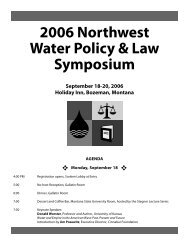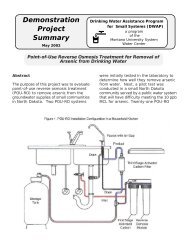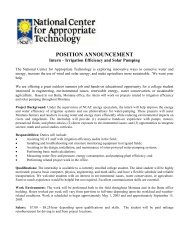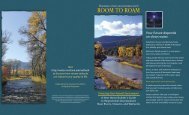aquaculturehealth - Montana Water Center - Montana State University
aquaculturehealth - Montana Water Center - Montana State University
aquaculturehealth - Montana Water Center - Montana State University
You also want an ePaper? Increase the reach of your titles
YUMPU automatically turns print PDFs into web optimized ePapers that Google loves.
CAN PARTNERSHIPS BE POSITIVE<br />
Partnerships between fish farm critics and fish farmers -<br />
do they have positive implications for fish health research<br />
EDITORIAL<br />
DR SCOTT PEDDIE, EDITORIAL DIRECTOR<br />
The recent announcement of closer research cooperation by<br />
Marine Harvest and the Coastal Alliance for Aquaculture<br />
Reform in British Columbia, Canada is an interesting one<br />
from a fish health perspective.<br />
The debate in west coast Canada surrounding the<br />
environmental impacts and sustainability of net-pen salmonid<br />
culture has been highly polarised for some time. The inevitable<br />
result of this has been what some would view as an unhelpful<br />
politicisation of scientific enquiry, involving claim and counterclaim<br />
from the main protagonists.<br />
The debate centering on the issue of the potential link<br />
between sea lice infection in farmed salmon and reduced<br />
performance in wild juvenile pacific salmon has raged on in the<br />
fish farming press and wider media for several years. Against<br />
such a backdrop it is difficult to see how any rational progress<br />
can be made in resolving either perceived or real issues in this<br />
area.<br />
Thankfully, both parties have realised this and have jointly<br />
produced a Framework for Dialogue. Although the framework<br />
still allows both Marine Harvest and the alliance to publicly state<br />
their respective cases and respond to issues as and when they<br />
arise, it provides the basis for a more constructive relationship.<br />
It should therefore be welcomed as an important step in the<br />
right direction.<br />
The issues raised in the document that are up for discussion<br />
appear at first glance to be very broad indeed, ranging from<br />
aboriginal rights to technology and socio-economic issues. As I<br />
read it, the question that immediately popped into my mind<br />
was, “Does this wide-ranging approach run the risk of<br />
unravelling for want of a clear focus”<br />
It seems that this has been mitigated against, at least to some<br />
degree, by the mutual identification and documentation of<br />
immediate research priorities as part of the framework.<br />
It is perhaps not surprising that the focal areas are the<br />
interaction between wild and farmed salmon and sea lice,<br />
migration corridors, and the economic<br />
evaluation of commercial-scale closed<br />
containment systems. It is a reminder, if<br />
any were needed, that fish health issues<br />
are of interest to a wide audience, not<br />
just readers of this magazine!<br />
For me, the key point in this document<br />
is that such research will be undertaken<br />
on a collaborative basis, reducing the<br />
likelihood of any bias, intentional or<br />
unintentional, creeping into the process.<br />
Nevertheless, as the saying goes, the proof of the pudding is in<br />
the eating. Given that the results of such research could<br />
potentially have far-reaching consequences for all parties<br />
involved, it remains to be seen how it will play out at a practical<br />
level.<br />
Notwithstanding the potential pitfalls that could befall such a<br />
venture as it beds down and evolves, it is certainly worth<br />
watching. And who knows, maybe it could even become a<br />
template for conflict resolution in other areas of the world<br />
where similar heated debates take place<br />
■<br />
SUBSCRIBE NOW! Be sure to get your<br />
copy of Aquaculture Health International direct by email<br />
Name _______________________________________________________________________<br />
Address _____________________________________________________________________<br />
_____________________________________________________________________________<br />
______________________________________________ Postal code ___________________<br />
Email ________________________________________________________________________<br />
ENCLOSE A CHEQUE FOR ___________________________________<br />
NZ$40.00 Electronic version by email, see www.<strong>aquaculturehealth</strong>.com<br />
■ Visa ■ Mastercard ■ Bankcard<br />
(other cards are not accepted)<br />
Card Number<br />
__________________________________________<br />
Card Name ______________________________<br />
Signature_________________________________<br />
Expiry date —— /——<br />
POST TO: VIP Publications Ltd, 4 Prince Regent Drive, Half Moon Bay, Auckland 1706, New Zealand GST No: 68-684-757<br />
FEBRUARY 2006 AQUACULTURE HEALTH INTERNATIONAL 3






